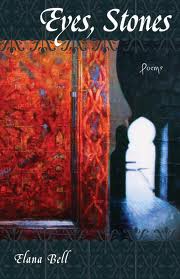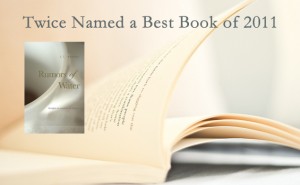What does poetry have to say to Isaac and Ishmael, Jew and Palestinian? More than one might expect. Certainly more than I expected.
Poet Elana Bell has taught poetry to educators, prisoners, and high school students. Some of those students are in New York City, where Bell is writer-in-residence at the Bronx Academy of Letters.
Others live in Israel.
And Palestine.
Bell’s first volume of poems, Eyes, Stones, won the 2011 Walt Whitman Award given by the Academy of American Poets “to the winner of an open competition among American poets who have not yet published a book of poems.” This volume id dedicated to her grandmother, who survived the Holocaust.
Bell’s poems move from the distant past to the recent past to the present, and then back again. We read, in spare and almost other-directed, oblique words, of pogroms against the Jews and what the Holocaust swept away, of life in Palestinian refugee camps and the occupation of the West Bank, and the poet’s own fears that what she writes will hurt Israel.
This is not the poetry of Mideast politics but the poetry of people – peoples – caught up in Mideast politics, whether the scene is set in the Auschwitz death camp or the Aida refugee camp.
Bell does not equate Holocaust Europe with the plight of the Palestinians. To do so would trivialize and mislead. But she does use her words and poems to create a common understanding of human suffering and pain.

The morning I sent Hagar and Ishmael away,
the sun closed its eyes. Nothing shone
on the muscled back I’d oiled in the dark
of the tent, her back, that shouldered the skin
of water, sack of bread, our boy.
I watched until they shrank into ants
and the desert whitened.
I could have given away anything after that.
That short poem serves as a kind of summary poem for the collection – the origin of the conflict, the almost palpable regret, the individual suffering and pain, and the consequences that lead from actions. Yet a solution is elusive, disappearing into that whitened desert.
Eyes, Stones is a moving, profound collection.
Photograph by Kelle Sauer. Sourced via Flickr. Post by Glynn Young, author of Dancing Priest.
______________________
- Poets and Poems: The Three Collections of Pasquale Trozzolo - September 11, 2025
- Poets and Poems: Boris Dralyuk and “My Hollywood” - September 9, 2025
- When You Don’t Speak Czech or German - September 4, 2025


Jon Lewis says
Abrahams poem makes my soul weep in the depair.
Maureen Doallas says
I have this book on my reading stack and look forward to picking it up.
I think the book’s title is wonderful, given its context. The labels are political; the story or stories of the poems thousands of years old, and universal.
Megan Willome says
That’s quite a poem. I didn’t think that little family could be more illuminated, but that snippet sure turned on the lights.
davis says
looks like she has done a lot of wonderful teaching…
Diana Trautwein says
Wow. Just that. On the wish list.